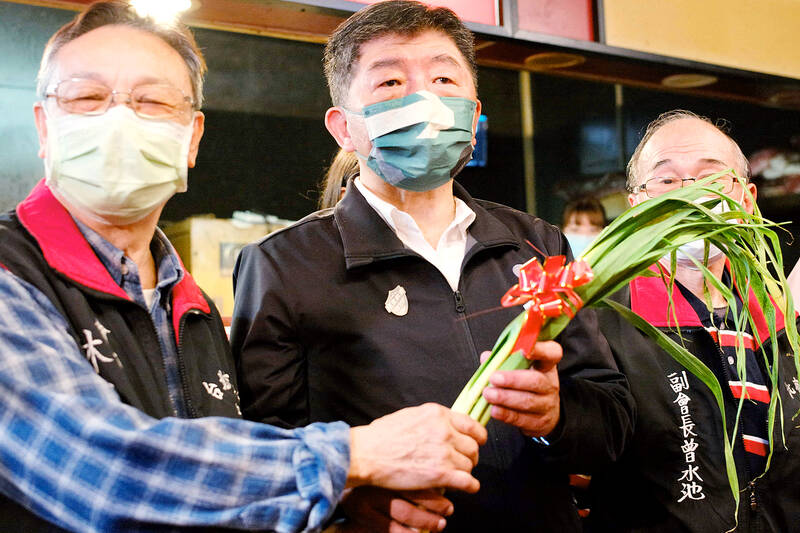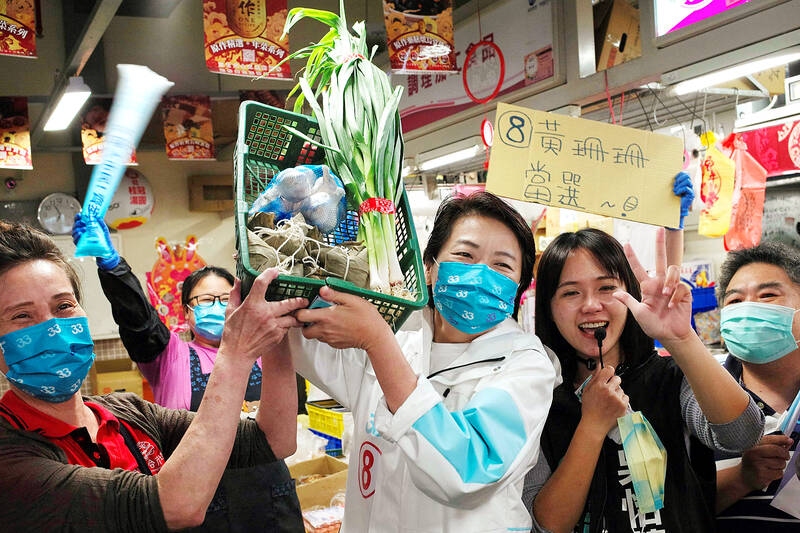In many parts of the world, a politician might hope for a picture-perfect moment with a voter’s baby to boost their poll numbers. But in Taiwan, vegetables are the kings of the campaign trail.
Whenever the democratic island of 23 million people goes into election mode, prospective candidates race to pose with smorgasbords of vegetables — large white radishes are a favorite — gifted by voters hoping to show their approval.
The reason is Taiwan’s love of homonyms: words that sound identical or similar but can carry multiple meanings.

Photo: AFP
In a political culture infused with good luck symbols and superstition — where candidates often seek advice from fengshui masters when deciding the location or opening date of their campaign headquarters — photo-ops with the right vegetable are routine.
Garlic (suan) is immensely popular because when pronounced Hoklo (more commonly known as Taiwanese) it also sounds like the word for “chosen.”
The daikon radish (tsaitao) is a winner because it is pronounced nearly the same as “good luck,” while pineapple (onglai) is a homonym for “prosperity comes.”

Photo: AFP
Ke Chiong-shu, 60, has been selling vegetables at the Wuxing Street Market in Taipei for more than a decade. Many of her district’s candidates have visited the market in recent weeks as Taiwan gears up to hold island-wide local elections on Saturday.
During a recent visit, it was former health minister Chen Shih-chung’s (陳時中) turn to press the flesh as he campaigned for the Taipei mayoralty, one of the most important posts up for grabs this weekend.
Ke grabbed some radish and garlic greens from her stall.
“Hope you get elected,” she beamed as Chen proudly turned around to display the gifted veggies to the chanting crowd behind.
“I give to all candidates regardless of their party affiliation,” Ke added. “I hope they all get elected so that they can serve us folks and strive for our benefit.”
PROGRESSIVE DEMOCRACY
After shaking off decades of martial law, Taiwan has evolved into one of Asia’s most vibrant and progressive democracies — a stark contrast to Communist Party-run China, which claims the island as its own and has vowed to one day take it, by force if necessary.
It can feel like Taiwan is in near-constant campaign mode. Presidential and parliamentary elections are held every four years and are often dominated by relations with Beijing.
In between are local elections held for a variety of positions, from mayoral posts in big cities to indigenous administrators and village chiefs.
Taiwan also has referendum laws that allow voters to regularly decide on a host of constitutional issues.
Saturday’s local election, for example, includes a referendum on whether to lower the voting age from 20 to 18.
BREAD-AND-BUTTER ISSUES
Local polls tend to be much less focused on geopolitics and center more on bread-and-butter issues like bad roads, stagnant wages and recent rising inflation.
“Something that is very special about Taiwanese local elections is how personable things get,” said political scientist Lev Nachman, who studies Taiwanese electoral politics.
Face-to-face greetings and a handshake or slight bow can go a long way in garnering support for a candidate.
“Older voters like to see their politicians in markets and early in the morning out on the streets,” Nachman said.
Under President Xi Jinping (習近平), China has become much more bellicose towards Taiwan, and Beijing has cut official communications with the island since President Tsai Ing-wen (蔡英文) was first elected in 2016.
Tsai’s Democratic Progressive Party (DPP), which has won the last two elections, sees Taiwan as a de facto sovereign nation.
The opposition is dominated by the Chinese Nationalist Party (KMT), which favors warmer ties with China.
Relations with Beijing plunged in August when it conducted huge military drills around Taiwan to protest a visit to the island by US House Speaker Nancy Pelosi.
But despite the very real threat of conflict, the drama has received minimal attention in the lead-up to this Saturday’s polls.
“Even though we just went through these very high-tension military drills in August, those aren’t really being talked about by local candidates,” Nachman said.
“Instead, it is much more about attacking opponents based on the quality of their character,” he added.
Nonetheless, Lin Pei-ying, 36, a DPP candidate who is running for councilor in the northeastern county of Yilan, says she believes her party’s commitment to maintaining Taiwan’s democratic way of life will still feed into voters’ decisions. “We are sending a message to China,” she said. “Taiwan is Taiwan, China is China.”

June 2 to June 8 Taiwan’s woodcutters believe that if they see even one speck of red in their cooked rice, no matter how small, an accident is going to happen. Peng Chin-tian (彭錦田) swears that this has proven to be true at every stop during his decades-long career in the logging industry. Along with mining, timber harvesting was once considered the most dangerous profession in Taiwan. Not only were mishaps common during all stages of processing, it was difficult to transport the injured to get medical treatment. Many died during the arduous journey. Peng recounts some of his accidents in

“Why does Taiwan identity decline?”a group of researchers lead by University of Nevada political scientist Austin Wang (王宏恩) asked in a recent paper. After all, it is not difficult to explain the rise in Taiwanese identity after the early 1990s. But no model predicted its decline during the 2016-2018 period, they say. After testing various alternative explanations, Wang et al argue that the fall-off in Taiwanese identity during that period is related to voter hedging based on the performance of the Democratic Progressive Party (DPP). Since the DPP is perceived as the guardian of Taiwan identity, when it performs well,

A short walk beneath the dense Amazon canopy, the forest abruptly opens up. Fallen logs are rotting, the trees grow sparser and the temperature rises in places sunlight hits the ground. This is what 24 years of severe drought looks like in the world’s largest rainforest. But this patch of degraded forest, about the size of a soccer field, is a scientific experiment. Launched in 2000 by Brazilian and British scientists, Esecaflor — short for “Forest Drought Study Project” in Portuguese — set out to simulate a future in which the changing climate could deplete the Amazon of rainfall. It is

What does the Taiwan People’s Party (TPP) in the Huang Kuo-chang (黃國昌) era stand for? What sets it apart from their allies, the Chinese Nationalist Party (KMT)? With some shifts in tone and emphasis, the KMT’s stances have not changed significantly since the late 2000s and the era of former president Ma Ying-jeou (馬英九). The Democratic Progressive Party’s (DPP) current platform formed in the mid-2010s under the guidance of Tsai Ing-wen (蔡英文), and current President William Lai (賴清德) campaigned on continuity. Though their ideological stances may be a bit stale, they have the advantage of being broadly understood by the voters.